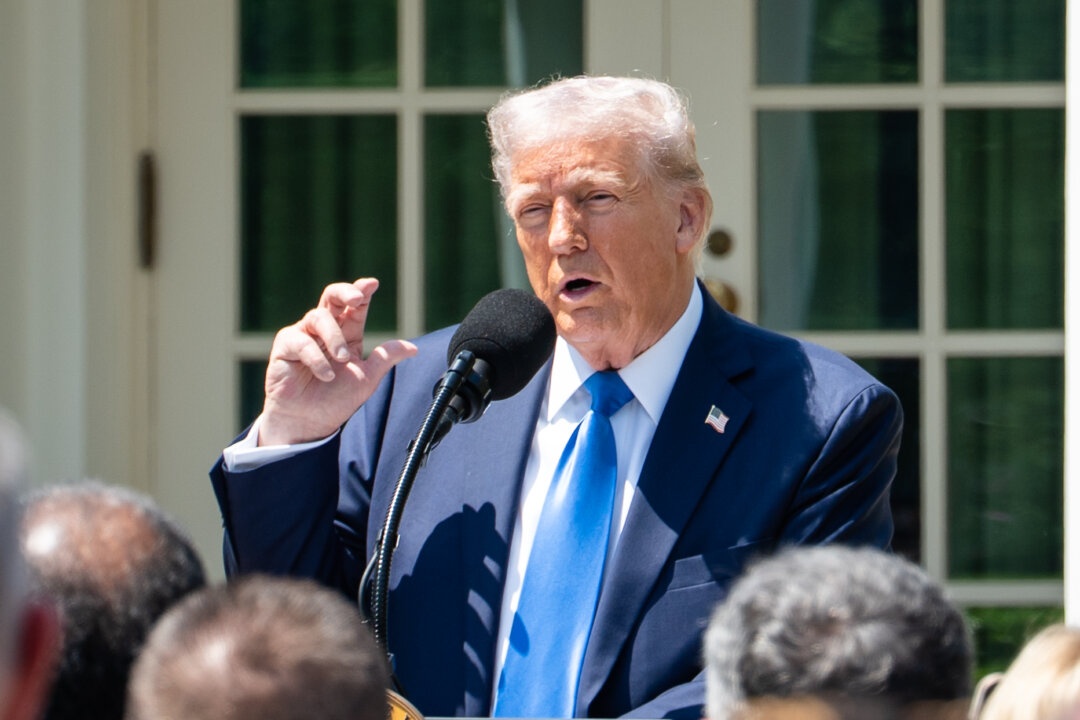The U.S. government has funded gain-of-function research in China.
President Donald Trump on May 5 banned federal funding for gain-of-function research in other countries, including China, just weeks after his administration said that COVID-19 likely came from a Chinese laboratory that received U.S. funding.
“It’s a big deal,” Trump said in the Oval Office while signing the executive order.
“Could have been that we wouldn’t have had the problem we had if we had this done earlier.”
The president’s order forbids federal funds from supporting risky research, which is aimed at increasing pathogenicity or another function of a virus, in other countries unless there is proper oversight.
“Many people believe that gain-of-function research was one of the key causes of the COVID pandemic,” White House staffer Will Scharf said while handing the document to the president to sign.
According to the order, the new rules will protect Americans from potentially dangerous research that includes the manipulation of viruses, toxins, and other biological materials.
The regulations are constructed so as not to interfere with the nation’s national security and readiness to respond to threats, White House officials said in a statement.
Changes are meant to improve enforcement, oversight, and transparency.
“What this executive order does, first of all, it provides powerful new tools to enforce the ban on federal funding of gain-of-function research abroad,” Scharf said.
“It also strengthens other oversight mechanisms … and creates an overarching strategy to ensure that biomedical research, in general, is being conducted safely and ultimately protects human health more.”
The directive empowers agencies to identify and rescind federal funding of any biological research that could endanger public health, safety, or security.
“These measures will drastically reduce the potential for lab-related incidents involving gain-of-function research, like that conducted on bat coronaviruses in China by the EcoHealth Alliance and Wuhan Institute of Virology,” the White House said in a fact sheet.
The National Institutes of Health and the U.S. Agency for International Development provided more than $1 million in funds to the Wuhan Institute of Virology, via the EcoHealth Alliance group, for experimenting on bat coronaviruses.
The Chinese city that hosts the lab is the same city in which the first COVID-19 cases were identified.
“By nearly all measures of science, if there was evidence of a natural origin, it would have already surfaced. But it hasn’t,” the White House says on its website, which was updated in April.
Officials also noted that researchers in Wuhan were sick with COVID-like symptoms months before COVID-19 was discovered at a wet market there.
“It leaked out, I’ve said that since Day 1,” Trump said. “I’ve never changed that opinion.”
EcoHealth has said the research in Wuhan did not result in COVID-19.
Administration officials said the ban will prevent future leaks from occurring.
“This is a historic day. The end of gain-of-function research,” Robert F. Kennedy, Jr., Health and Human Services director, said during the signing event.
He described the history of dual-use research for vaccine and military purposes by U.S. intelligence agencies dating back to 1947.
Such risky research was banned in 1973 by the Bioweapons Charter, but a line in the PATRIOT Act, passed in 2001 after the anthrax attacks and 9/11, exempted officials from liability and thus led to a resurgence in gain-of-function funding, according to Kennedy.
“It’s a weapon that always has blowback, it’s always bad news,” Kennedy said, pointing to three instances in 2014 when lab leaks occurred.
“In all the decades of bioweapons research, we can’t point to a single good thing that has come from it.”
He said other nations, including China, are developing all types of weapons using artificial intelligence and genetic technologies, which he described as “devastating.”
“There’s always a danger that in doing this research, it might leak out, just by accident even, and cause a pandemic,” Jay Battacharya, director of the National Institutes of Health, said during the signing ceremony.
“Any nation that engages in this research endangers their own population, as well as the world, as we saw during the COVID pandemic.”

